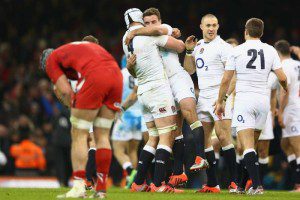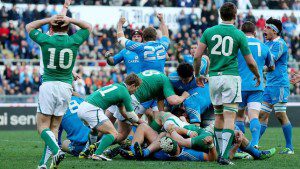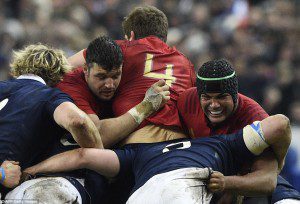CASTRES, FRANCE – Voices were raised in song at Cardiff’s Millennium Stadium on Friday – but it was the words to Swing Low Sweet Chariot not Bread of Heaven that soared heavenwards, as England delivered a huge psychological blow to future World Cup opponents Wales in the opening match of the 2015 RBS Six Nations.
Warren Gatland didn’t try to offer any excuses for his side’s defeat. He couldn’t. It quickly became clear that, once Wales had lost the pre-match mind games, they had lost the match. Which is criminal, given the pool of rugby talent Gatland has at his disposal.
England coach Stuart Lancaster didn’t play his games. Lancaster first refused to be drawn when Gatland named his side 48 hours early. And he refused to be drawn about why he refused to be drawn.
He refused Wales request to close the Millennium Stadium roof. Why? He didn’t say. He didn’t have to. It was his prerogative – and there was no legitimate weather-related reason to close it. What it did mean was that the lid was off the Welsh pressure cooker.
He kept his counsel about why England were training with deafening, distracting music blasting out around them.
The silent treatment must have driven Gatland mad.
Then, as the game was about to start, England’s fast-maturing captain Chris Robshaw won one final pre-match battle of wits. He refused to lead his team out on to the pitch when instructed by a stadium official, instead waiting until referee Jerome Garces told both teams it was time to get this RBS Six Nations party started.
So, Wales were behind before the game had even started. If they hadn’t realised earlier, Wales surely had an inkling this England was not here to be cowed.

Ten minutes later and 10-0 up, they must have known despite the scoreline that was flattering to deceive. The dead-eyed Leigh Halfpenny had punished England after Johnny May had not rolled away from a tackle. Then, Rhys Webb had skirted over the line to score the first try of the tournament following a 5m scrum.
But the try had nothing to do with the scrum – and everything to do with a piece of incredible skill from number 8 Toby Faletau. With the Welsh pack in the midst of a disorganised retreat in the face of a display of sheer power from the lighter England scrum, Faletau performed a magical muscular pirouette to pick up the ball, beat James Haskell and offload to Webb, who beat May on the outside to run in.
Had this been two years ago, England would have panicked. And England would have crumbled. This was not two years ago. England kept the head – and, almost immediately, Six Nations debutant Anthony Watson was quickest to react to Mike Brown’s grubber kick down the right.
George Ford missed the conversion, but he was starting to find his range, while Halfpenny missed what was – for him – a relatively straightforward chance. Despite Dan Biggar’s drop-goal that gave the hosts a 16-8 halftime lead, Welsh euphoria in the Millennium Stadium was tinged with fear . Maybe – this time – they would not be good enough.
Fear turned in to gut-chilling certainty when the quick-thinking Jonathan Joseph added a fleet-footed five-point flourish to a brutal, battering England attack. In truth, there was no certainty that the visitors would score when the ball came to the Bath centre after more than 20 phases. But he found an almost impossible path to the line outside Biggar, under George North and inside Webb.
From then it was all England.
Haskell should have scored their third try but, having smashed through the Welsh defence to the goalposts, he was denied by the padding. A Ford penalty gave the visitors the lead for the first time as the match entered the final quarter – and when the referee ruled out Dave Attwood’s try because Nick Easter had got in the way of Dan Biggar a few phases earlier in the move, the Welsh cheers that rang out were in relief that the final score would not be quite as brutal as it could – perhaps should – have been.
Advantage England, then, for the World Cup pool match at Twickenham in September.
Like Gatland, Ireland coach Joe Schmidt has some work to do, though at least his side did enough to beat Italy 26-3 on Saturday. But if Ireland give up possession as easily as they did at Stadio Olimpico against England, or France, or Wales, they will quickly find themselves in deep trouble.
Unlike the frantic thriller that was Wales v England, this was a long way from an advert for the RBS Six Nations. In the end, the 205 tackles that Italy had to make in what had turned into an extended tackle practise session proved too much, and Ireland put the game beyond doubt with two quick tries in the final 20 minutes.
Remarkably, a large chunk of those tackles were made in a period of concerted Irish possession between the start of the second half and the first of the visitors’ tries, when scrum-half Conor Murray darted through a forest of defenders to score after 65 minutes.

It was just reward for a halftime step-change in Irish tactics – if you can call hanging on to the ball a tactic – after an opening period in which the Italians had proved more than capable of dealing with anything the profligate visitors could throw at them. The 9-3 halftime score actually flattered the Irish, who had been worse-than dismal in the opening period.
A minute after Murray had scored, Tommy O’Donnell, a late call-up after the unlucky Sean O’Brien had strained a hamstring during warm-up, charged past a tackle-weary Martin Castrogiovanni and through Andrea Masi to score. Surely O’Donnell has done enough to put his name on the teamsheet for the match against France next weekend.
Job done, then, but Schmidt will be keen to welcome back Jamie Heaslip and Jonny Sexton for France’s visit to Dublin next weekend – though the fly-half’s stand-in, Munster’s Ian Keatley, did little wrong after overcoming early nerves.
France were also far-from impressive in opening their RBS Six Nations account with a victory, but they did at least offer a suggestion of better things to come when they beat Scotland 15-8 in Paris on Saturday evening.
If any side should be happier with the result, it’s Vern Cotter’s Scotland. They will face Wales next week in Edinburgh with renewed confidence after doing rather more than playing the part of plucky losers in the face of a French forward maelstro,.
In the land of Gallic flair, the Scots showed the greatest invention. Full-back Stuart Hogg was, on more than one occasion, superb – especially when he basked in the extra space afforded him after a couple of cheeky half-breaks from Finn Russell meant France’s back row had to keep half an eye on the fly-half.
It was inevitable that Hogg would be involved in the only try of the game. Scotland were 9-3 down when his break started the move. Two rucks later, Dougie Fife was screaming for the ball out wide. And so it went – via prop Euan Murray, whose give-and-take was a delight.
Skipper Greig Laidlaw smacked the upright with the conversion attempt from out wide, meaning that Scotland headed into the tunnel just 9-8 down.

Paint was probably stripped from the French dressing room at halftime, given the intent with which the forwards came out for the second period. They were led by replacement hooker Benjamin Kayser, who was clearly out to prove that he should be wearing the number 2 jersey, rather than the number 16.
Through maul after maul, France’s big men heaped on the pressure, harried on by Morgan Parra, who replaced Rory Kockott at scrum-half after 54 minutes. With Parra controlling proceedings and the forwards taking responsibility for holding on to the ball, the hosts were in control. All Scotland could do was tackle their hearts out and wait for an error.
That’s just what they did. One Camille Lopez penalty apart, they didn’t wilt. Even when Johnnie Beattie was sin-binned for illegally stopping another French maul, they did not cave. And when France tried to find a way through via their speedy backs, they nearly gave it away.
Tom Visser was a finger-length from an interception try as a wayward pass looped to Yoann Huget. As it was, the Toulouse flyer set off for the Scottish line. He managed to cut inside Hogg but was hunted down by Bennett.
Tiring Scottish legs conceded another penalty, and Lopez extended France’s lead to seven points, prompting the crowd to sing La Marseillaise – perhaps with no little Gallic irony. This was hardly free-flowing French majestry. But it hinted, if not at the shape of things to come, that Les Bleus, whether they’re in weird red or not, should not be easily discounted in this RBS Six Nations.
Feel free to add your thoughts below, please look for and “Like” our Facebook Rugby Wrap Up Page and follow us on Twitter@ :RugbyWrapUp, Junoir Blaber, Nick Hall, James Harrington, Jamie Wall, Jaime Loyd, DJ Eberle, Cody Kuxmann, Karen Ritter, Scheenagh Harrington, Jake Frechette and Declan Yeats, respectively.

